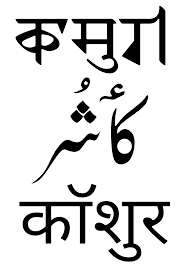Language/Kashmiri/Grammar/How-to-Use-Have
Hi Kashmiri learners! 😊
In this lesson, we will learn how to use the verb "have" in Kashmiri. "Have" is used to indicate possession or to form certain tenses in a sentence.
Let's start with the basics. In Kashmiri, "have" can be translated as "naas".
With the completion of this lesson, consider investigating these related pages: Pronouns & Questions.
Present Tense[edit | edit source]
When using "have" in the present tense, we use the following forms:
| Kashmiri | Pronunciation | English |
|---|---|---|
| मेर्ये नास | Marye naas | I have |
| तुज्ये नास | Tujye naas | You have (informal) |
| चुये नास | Chuye naas | He/She has |
| अस्सी नास | Assi naas | We have |
| तुसी नास | Tusi naas | You all have (formal) |
| ते नास | Te naas | They have |
Example:
- Person 1: ति नम्ब नास? (Ti namb naas? - Do you have a name?)
- Person 2: जी, मेर्ये एक नाम नास। (Ji, marye ek naam naas. - Yes, I have one name.)
Past Tense[edit | edit source]
When using "have" in the past tense, we use the following forms:
| Kashmiri | Pronunciation | English |
|---|---|---|
| मेनु नासीं | Menu naasi | I had |
| तुज्येनु नासीं | Tujyen naasi | You had (informal) |
| चुयेनु नासीं | Chuyen naasi | He/She had |
| अस्सीइनु नासीं | Assiinu naasi | We had |
| तुसीनु नासीं | Tusiinu naasi | You all had (formal) |
| तेनु नासीं | Tenun naasi | They had |
Example:
- Person 1: की तूझेनु द्राख्त नासीं? (Ki tujyen drakht naasi? - Did you have a tree?)
- Person 2: जी, मैंनु द्राख्त नासीं। (Ji, mainnu drakht naasi. - Yes, I had a tree.)
Future Tense[edit | edit source]
When using "have" in the future tense, we use the following forms:
| Kashmiri | Pronunciation | English |
|---|---|---|
| मेनु नासूंगा | Menu naasoonga | I will have |
| तुझेनु नासूंगा | Tujyen naasoonga | You will have (informal) |
| चुयेनु नासूंगा | Chuyen naasoonga | He/She will have |
| अस्सीइनु नासूंगा | Assiinu naasoonga | We will have |
| तुसीनु नासूंगा | Tusiinu naasoonga | You all will have (formal) |
| तेनु नासूंगा | Tenun naasoonga | They will have |
Example:
- Person 1: ति क्यारे अंदर रस्स नासूंगा? (Ti kyare andar rass naasoonga? - When will you have juice?)
- Person 2: गतचिन मज़े में रस्स नासेड़। (Gatchin maze mein rass naased. - I had juice in the morning.)
Present Perfect Tense[edit | edit source]
When using "have" in the present perfect tense, we use the following forms:
| Kashmiri | Pronunciation | English |
|---|---|---|
| मेनु नास लेख | Menu naas lekh | I have had |
| तुझेनु नास लेख | Tujyen naas lekh | You have had (informal) |
| चुयेनु नास लेख | Chuyen naas lekh | He/She has had |
| अस्सीइनु नास लेख | Assiinu naas lekh | We have had |
| तुसीनु नास लेख | Tusiinu naas lekh | You all have had (formal) |
| तेनु नास लेख | Tenun naas lekh | They have had |
Example:
- Person 1: अस्सी आएत्ठ साफ़ कुछखास खान का ता नःदुर्मूत हैं अजि ति सोइ पज़ नास लेख? (Assi aayath saaf kuchkhaas khan ka ta naqdurmoot hain aji ti soi paz naas lekh? - We have been here a while, and since you are not allergic to anything specific, have you had dinner?)
- Person 2: जी, मैंनु सोऊ खाना नास लेख। (Ji, mainnu sou khaana naas lekh. - Yes, I have already had food.)
Negative Forms[edit | edit source]
To make a negative sentence using "have", we add "na" in front of the verb.
Example:
- मुज़े त्रावल बुक कत़ नास। (Muze trawal book kat naas. - I don't have a travel book.)
Remember to always keep practicing! With time and dedication, you can master the use of "have" and improve your overall |Kashmiri |Grammar. If you have any questions, don't hesitate to ask |native speakers and continue practicing! 😀
➡ If you have any questions, please ask them in the comments section below.
➡ Feel free to edit this wiki page if you think it can be improved. 😎
Other Lessons[edit | edit source]
Sources[edit | edit source]
- Kashmiri language - Wikipedia
- (PDF) Modern Kashmiri Grammar | Omkar N Koul - Academia.edu
- Kashmiri Grammar - How to Use "Be"

